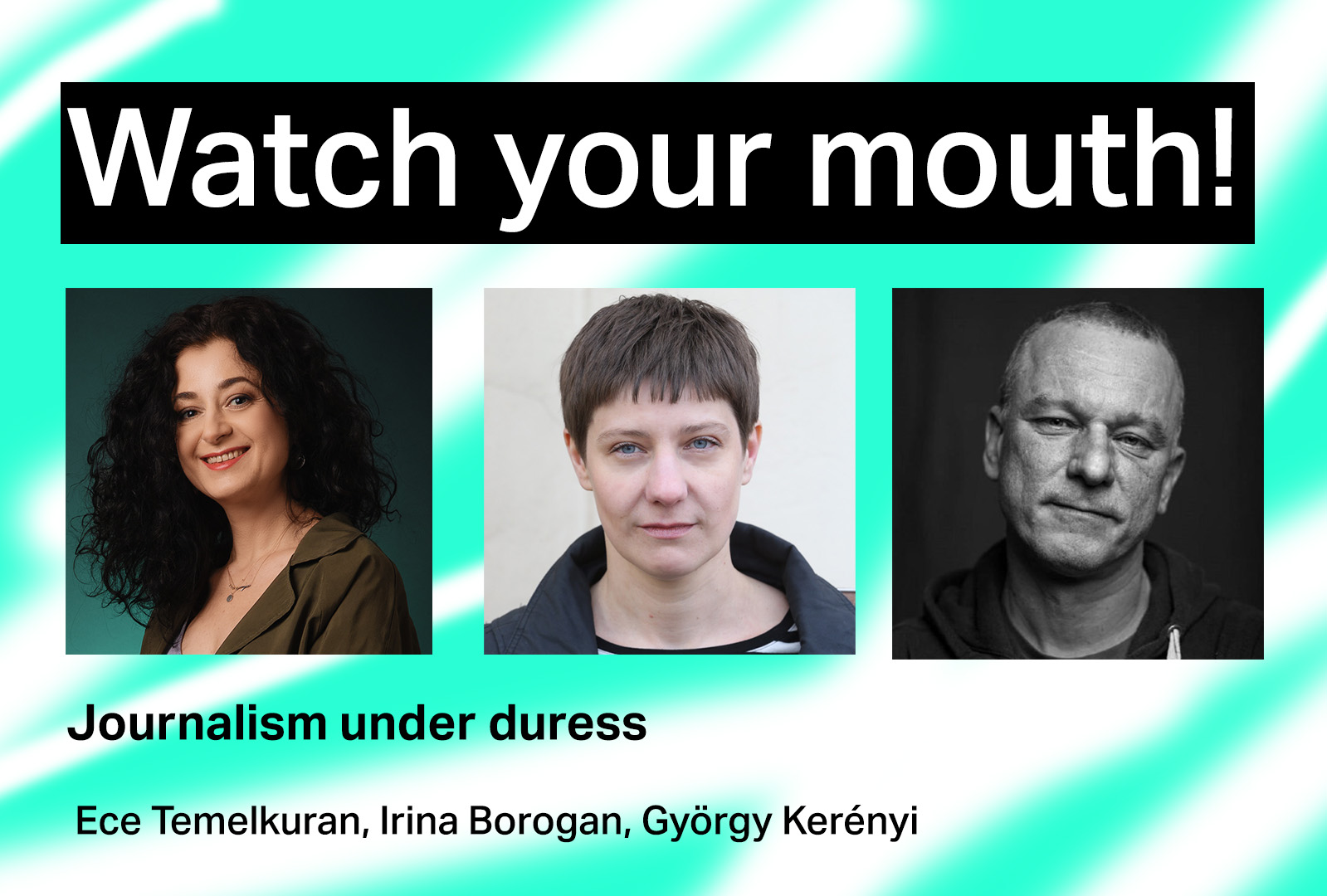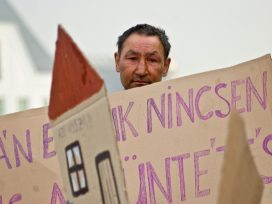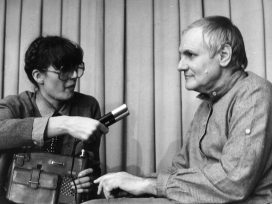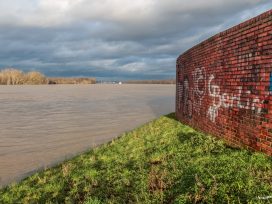Journalism under duress
From the 31st European Meeting of Cultural Journals
Three opposition journalists from Turkey, Russia and Hungary talk to Eurozine’s editor-in-chief about repressive regimes, personal risk, migration, the role of the media and the future of their profession in the digital age.

Réka Kinga Papp: Irina, you are from Moscow and have lived there most of your life, with occasional trips of a couple of months or so outside Russia. Your connection with Eurozine dates from your stay in Vienna last year. But now you are based in London and, in the current situation, you may not be able to relocate back into Moscow. I’m aware it’s a painful subject, but could you tell us about what you’re facing now and how it’s influencing your work?
Irina Borogan: It’s not easy when you find yourself living abroad after spending your whole life in a single country. For me that was Russia. I worked for Russian and Western media there, and published three books. The situation in Russia had been dangerous for some time, but until August last year I had no intension of leaving. Then my partner, Andrei Soldatov, and I received a number of threats and warnings from the authorities, so we decided to get out for a time.
I must explain that we had set up a website, agentura.ru, which focuses on the security services. We had published a lot of investigations, including a book entitled The New Nobility about the Federal Security Service (FSB) – that is to say Russian counter-intelligence. It’s the most dangerous government agency in the country. Agentura.ru had a media licence and we operated accordingly. But last year we suddenly learned that our media licence had been cancelled.
Andrei is the editor-in-chief of the website, so he looked into what had happened. It’s very rare for a licence to be revoked without notice. Normally, it’s a big deal: governmental bodies send you warnings and letters indicating that you’ve broken the law or something of that kind. You can’t just be stripped of your licence. Andrei decided to check what was going on and discovered that our licence had been cancelled because the physical person who had obtained the licence was now dead. That physical person was in fact Andrei. Obviously, this was a sign that we had to do something and now we’re both visiting fellows at King’s College, London.
I’m trying to carry on with my job and my work. Since the Covid era began a year ago, the way journalists gather information has changed: we can access far more online. It’s not ideal, of course. You still need to meet your sources and gather information personally. You have to meet people and win them over. You have to understand what’s going on and be fully up to speed. But in some ways, it’s getting easier to discuss sensitive issues via the Internet. Recently, we’ve updated our information on the FSB and posted a lot of new information about the intelligence service. We’ve drawn on our own sources as well as a wide range of open sources. We’re not going to stop.
Réka Kinga Papp: Hungary, Turkey and Russia are three very different playing fields. We’re not going to act like they’re the same. But you’re all facing some kind of repression – which may be more or less overt – and a lot of administrative obstacles: whether it’s the withdrawal of licences through loopholes or the posing of economic obstacles. György Kerényi, you have set up many, very different types of media outlets. You have contributed to them and been very successful. Currently you are working not as an editor but, once again, as a journalist. You say that you are experiencing an ‘encapsulation’ which affects your work and have remarked that journalists seem to be caught in a bubble. How have you sensed this? What do you make of it? How does it affect your work? And is it possible to burst out of this bubble?
György Kerényi: The Hungarian regime is much less repressive than the Russian one and the pressure comes mostly from media ownership. One major problem in our profession, and our role as journalists, is that we are trained or socialized to balance different opinions and be impartial. But the situation in our country doesn’t permit neutrality. Today, what we say and the way we work needs to reflect a single aim: that our authoritarian leaders must go. That is what our objective should be.
On the other hand, journalistic ethics call for us not to participate in political struggle but to report it. We are trained to observe a contest in which we do not take sides. Yet, in our countries, no real competition between political actors can be said to exist. That is the disconnection we face within our role and in our daily work. We should be taking sides, but we are not socialized for it. I am reminded of the situation before 1989 – although, obviously, since then new internal tensions have emerged in Hungary. Before the transition, there was a repressive regime on the one hand and an oppressed society on the other. But over the last thirty years we have been socialized for a different kind of socio-political model. We took the best from European liberal democracies – the notion of checks and balances, rules – yet it doesn’t work in the situation we have now.
Réka Kinga Papp: Is there a way to overcome this disconnection? I understand that you identify with colleagues who end up choosing sides and ‘signing up’ with the opposition, either by joining a political party or in some other way. But even if people don’t choose a particular political stance, they end up positioned as ‘freedom fighters’ or ‘dissidents’ or ‘exiles’ – which are all problematic terms. How do you overcome these labels? As I understand it, you don’t want to take a stance here. Do you have a personal recipe for avoiding these ‘positions’?
György Kerényi: Unfortunately, I have no recipe. Over the last twenty years I have been editor-in-chief at a range of different media organizations. Since 2010, when the Hungarian ruling party, Fidesz, won its landslide victory, I have seen a lot of journalists go through media outlets which I have led and I think that, over time, they have abandoned the basic practice of questioning all parties. They know you should ask the government, but, because you never get answers from government, you stop sending out the questions. Or else you publish the article in real time, two hours after questions have been despatched. People working in the independent sector of the media function within each other’s opinion bubbles. They hear nothing but their own stories. No one is holding up a mirror to these narratives and it’s very bad for our work.
Irina Borogan: It’s sad to hear this, because in eastern Europe the dissident movement was stronger than it was in the Soviet Union, and democracy was more balanced from the beginning. There were not as many oligarchs exerting influence on politics. But I still believe that countries like Poland, Hungary and Czechia could do better. As for Russia, it seems that we’re trapped in our post-totalitarian heritage. Initially, I didn’t think we could change anything in the short term, but, in the late 1990s, I became certain that we would. There were so many young people who rejected the Soviet experience and they seemed to be the opinion influencers.
Then, after Putin came to power, there was the Chechen War. There was the financial crisis, people got poorer, and there was a lot of anger directed at the idea of democracy because the public linked it to these negative experiences. Putin may have been appointed by President Yeltsin, but, later, people genuinely voted for him. Russians of voting age had grown up in a totalitarian country and imbibed totalitarian ideas from their parents. This may not have happened in direct ways – with ideas about the western decadence and the evils of pop music – but they absorbed the notion that you have to have someone at the top who will make decisions for you, stripping you of any kind of responsibility. That is what I see now.
Réka Kinga Papp: I believe that Ece may have a different view of these trajectories. I understand that you are less optimistic about established democracies, right? Your experience is often grandly labelled a story of ‘exile’. But I believe you reject this term or at least find it problematic? You have also predicted that democratic institutions may not be as stable as people would like to believe.
Ece Temelkuran: When Irina mentioned that Andrei had been ‘proclaimed dead’, I thought of my own experience, and how I ended up in Zagreb. After 2016, following the attempted coup in Turkey, Recep Tayyip Erdoğan turned the crisis into his biggest opportunity. His regime was already oppressive, but now he began to behave like a dictator. One indicator was a spate of ‘lost passports’ at the border. When people were trying to leave the country or come into Turkey, officers at passport control would tell them their passport had disappeared. They’d take your passport away and not return it. One reason I wanted to get out of the country was that these confiscations were unpredictable. You never knew what would happen, because this wasn’t the rule of law, these were impulsive, arbitrary tools of oppression imposed by the authorities.
On one occasion I was returning to Turkey from London, and the official at passport control took my document and looked at it, then at me, then at the passport again, and so it went on. It took so long… I thought, ‘This is it. They’re either going to arrest me or they’ll take my passport and I’ll be trapped in the country.’ Then, all of a sudden, she screamed: ‘You’re Ece Temelkuran! Can we take a selfie?’ And a police officer took the picture. I remember half crying, half laughing. But at that moment I thought, I cannot take this anymore. The worst thing is not knowing what’s going to happen. You may be arrested or you may be asked to pose for a selfie. I realized how much fear had taken over my thinking and my daily life. At one stage, many of us were going to bed all dressed up in our pyjamas, because we thought they might come for us at five o’clock in the morning.
About five and a half years ago I went over to Zagreb for a few days, and made a spontaneous decision to stay. But the time I’ve spent here feels like non-time. To me, Zagreb feels like a non-place. When you leave your own country, you start to live in this abstract state of in-betweenness. You’re not in the country, you’re looking at the country. You’re not a local, you can’t really become a local in a new country. It’s a liminal, in-between state. But then, in this in-betweenness, people also ask you what you have been through. They want you to tell your story, your personal, exclusive story.
In my career as an international journalist and as a writer, I’ve told stories from all around the world. But I’d never tried to tell my own story or my country’s story. But, in European countries, they like you to act as a victim who has escaped the hands of the barbarians and thrown herself into the arms of the civilized world. Some Europeans seem to find it flattering or reassuring to hear that their continent is still a safe haven for free thinkers, individual freedoms and so on. But this forces you into the role of an exile.
Whenever I’ve been talked about in public over the last five years, the introduction has always been, ‘She’s an exile from Turkey’. It’s as if this was the sexiest line of my CV. It’s easy to say the word ‘exile’, but it is not easy for people like me to wear it. Because once you’re clothed in that word, you can never get rid of it. Once an exile, always an exile – even if you go back to your own country. This is a burden I don’t want to carry. It was imposed on me by a political regime. I don’t feel it belongs to me. I didn’t choose it. So I’m trying to see this bit of my life as part of a bigger journey. I’ve lived in many countries: Tunisia, Lebanon, France, Britain… I know what it is to be away from home. But this is the first time I’ve been compelled to be away.
During the years I’ve lived in other countries, and especially recently, I’ve had almost too much time to think about what our country is, what I’m missing and what I’ve been fighting for. What is this country that makes us suffer so much? Why do we choose to suffer? I’ve come to think that a home country is like a table. The West is the abstract entity that surrounds this table, but those seated around it are your loved ones. And you miss them, perhaps more than the country itself. You miss the language and the comfort of not having to explain your jokes. But that doesn’t mean we’re victims.
In the past, if you asked someone to say the first word that came into their head when you mentioned ‘Russia’, they would respond Dostoevsky, Tchaikovsky or Lenin, for example. Now, in the West, it feels like there’s only one person living in Russia, and that is Putin. This is unfair on Russia. Journalists who have moved away from oppressive regimes are represented in the western media as exiles or dissidents, but that links our existence to dictators who don’t deserve to be the symbols of our countries. Orbán, Putin and Erdoğan shouldn’t be promoted as the faces of the countries they rule. It’s unjust to elevate them to this status. For me, now, the face of Russia is Irina and the face of Hungary is György. We must insist on this. Because these leaders invade too much space. They dominate the image of our countries, leaving no room for others like us. I think it should be highlighted that it is not they but we who represent our people.
Réka Kinga Papp: There is a great literary tradition associated with exile, along with certain patterns that are easy to relate to. It’s harder to find similarities between yourself and someone you don’t want to share a space with. A lot of media professionals, writers and artists find themselves displaced because they want to stick to their profession. They want to carry on working, so they choose another location. But a lot of them become the voices that publicly represent everything that is not of their country or its regime, right? As an exile, you are supposed to represent everything that is not Erdoğan or Putin or Orbán. That puts a burden on everything you say. But it’s also the lifeline of a media professional: to talk about your own country, to be a correspondent from somewhere.
Irina Borogan: I have been reading literature on exiles since I was a child. In fact, a year ago, Soldatov and I published a book on political emigration entitled The Compatriots. It’s about Russian political emigrés and their complicated relationship with the Kremlin. But I still don’t feel I’m in exile myself – maybe because I left Russia just eight months ago. I don’t have this sad feeling that I’m an emigré. I’m working on a new book, and I still feel quite optimistic. I gathered my material for the book back in Russia, as far as I could at the time. Then I had to do research outside the country, in archives in the US and the UK, because the book is about espionage and there are major protagonists on both sides: in Russia and in the West. I feel bad about what’s going on in Russia because many people have been placed under criminal investigation and some have been imprisoned. I feel I should be participating in Russian life more than I can from here.
Réka Kinga Papp: Maybe, as Ece says, the experience of the exile from within is different from what is seen by the outside world, or how the outside world understands it. Because there’s very little heroism in the everyday. In an article titled The Europeans, Enda O’Doherty cites a writer who says: it’s lovely that French colleagues ask me about how I’m doing and what my hopes are for my country, but nobody ever wants to know if I have enough money for lunch. This a very real problem. When you’re faced with these existential and not particularly intellectual issues, the perspective changes.
György, you are used to crossing borders. You have also worked for Rádió Pátria, the Hungarian channel of Slovakia’s public TV and radio broadcaster, and a station that’s not necessarily mainstream for Hungarian speakers. I don’t know how this fits into the situation you described earlier: the sense of being encapsulated in a bubble. Of course, Slovak media is very different from Hungarian media right now. How do you feel that borders and different organizational structures inform your work? Or have you been able to draw on your experience with the Slovak public broadcaster for your work in Hungary?
György Kerényi: The media landscape in Slovakia is very different from the Hungarian one. For example, in Hungary advertising comes mainly from the state. I think this is unique. Media oligarchs and media companies are funded from the state budget, which is not the case in Slovakia. As you say, I worked for the Hungarian section of the Slovak public service broadcaster. Because there are so many Hungarian minority communities in neighbouring countries, the size of Hungarian media audiences is about the same abroad as it is in Hungary. And the Orbán regime takes advantage of this ‘virtual national unity’ with Hungarians abroad to export its patron-client political system. So minority communities outside the country, who are also consumers of Hungarian mainstream media, are becoming a part of the Hungarian regime as well. When I was working in Slovakia, I sometimes felt there was one special filter bubble for Orbán supporters and another for the opposition.
Réka Kinga Papp: Ece, you often say that you are constantly being asked about your personal story, whereas your professional choice as a writer and journalist would be to tell the stories of others. How do you access those others now that that your dominant experience is being on your own? In an article entitled The paper pain, which can be read in Eurozine, you said: ‘I am what I write’. How do you approach all this?
Ece Temelkuran: I trespass over the boundary by telling people their own stories. When they ask for my story, I respond with their own story so that they understand that what we’re going through in our different countries is in fact the same. We are witnessing the morbid symptoms of collapsing regimes, and the indicators are the Putins and Netanyahus of our age.
We are all suffering from rising right-wing populism, this new form of fascism. So, I start by telling them their own stories. That is why I wrote How to Lose a Country: Seven steps from democracy to dictatorship, which begins by addressing this idea of telling people their own story. Earlier I also wrote another book entitled Turkey: The insane and the melancholy. I spoke about this at the London Frontline Club recently, about Turkey, how we suffer, the oppression and so on. After I had finished, a woman in the audience brought her hands together and asked in this very compassionate voice, ‘So what can we do for you?’ And suddenly I felt like a baby panda being adopted by a website. So, I said, ‘You know what? Actually, the question is, what can I do for you?’
That question and my answer inspired How to lose a country. Western European countries have this illusion that they are immune to what we are facing in Russia, Hungary, Italy or Turkey. They think these are crazy countries in which anything can happen. They have all the answers about why these things have happened there and not in their own country. Certainly, this was the case when I started writing the book in 2016. By the time I published it in 2019, my predictions were coming true. Boris Johnson was the prime minister of England. Trump is still a spectre haunting the White House. In Germany and France, the political centre is barely holding. Every country is vulnerable to this poisonous malaise of our age, this new form of fascism. But it’s not easy to hear your story from a woman with an ugly accent in English. People thought, ‘Ok, this woman imagines she’s Cassandra and she can’t be taken seriously.’ But in 2021, after two years, my book suddenly became very timely and popular. People realized that ‘crazy’ countries weren’t crazy to start with. It was this new form of fascism, which we had experienced earlier than western European countries, that made us appear crazy.
One interesting thing is that our countries – Hungary, Russia and Turkey – are not easily accessible to a westerner. The psyche, the Zeitgeist, the political circumstances are too complicated. Whereas we ‘outsiders’ know western languages, and can access information more easily. For me this also acts as an antidote to the fact that I am constantly being forced to tell my story, my story alone. It’s a proactive way of continuing to be a writer in this situation, not to be confined to my own story or my country’s stories.
Irina Borogan: Isn’t this a way of finding a new audience and a new voice?
Ece Temelkuran: In a way. But I emigrated to another language as well. I hadn’t written in English until I wrote How to lose a country and, when it was out, I felt like, ‘Ok, this isn’t my book. It’s in another language. It feels weird.’ Until recently, I didn’t feel like I owned the book.
Irina Borogan: My situation is very different because, in Russia, all my books were always written in English. Soldatov and I didn’t have a publisher there. People were afraid to publish books about the FSB, or the Kremlin’s wars on the Internet, or political emigration. So we found a way of publishing our books in the West. Then, a year or so afterwards, a Russian publisher would publish a translation. A translated book doesn’t carry the same legal risk, so this is one way of transferring information back to your audience at home.
Ece Temelkuran: That’s the sad part. It’s also very ironic. How to lose a country isn’t published in Turkey for political reasons, but the new book I’ve written in English will be translated into my mother tongue. My book won’t be in my Turkish. I may have to rewrite the translation when I could have written in Turkish in the first place. Things work in curious ways.
Réka Kinga Papp: György, you had a very intense pandemic experience. You launched a print daily a week before the first lockdown, which basically killed the paper, as I understand. Now you’re working with Radio Free Europe. You’ve said you love being back in the editorial room, doing the day-to-day journalism you weren’t able to do as an editor-in-chief.
György Kerényi: It’s good to pass on practical knowledge, teach young colleagues and show them how to view the media as an industrial, political and ethical actor. But I don’t think anything will change once the pandemic is over. I know Orbán’s political practice well and it has flourished, which is proving terrible for the community as a whole. Divisions have been strengthened, borders between different political and cultural camps have grown bigger, taller and tougher during the pandemic. I think that’s how it will go on.
Réka Kinga Papp: What kind of advice you would give to people starting out in professional journalism or in literature. What perspective would you offer them? Are they going to find a cache of treasure? Or has the next generation already been lost?
György Kerényi: I don’t like to talk about generational differences, but, if you read the media theory, you realize that this really is another generation. I often think about where our fault lies, how this authoritarian regime emerged, and how the media in Hungary could have come to this. One of our mistakes was that we didn’t realize that, while we were insisting on the watchdog function of the media, most people consume media purely for entertainment. Far more so than twenty or thirty years ago. We didn’t reflect enough on the implications of our gatekeeper role and now we are running after audiences trying to get the highest possible ratings.
The new generation of journalists has been socialized to work in this way, however. My association with the media department of ELTE University ended in 2008, but I know that more than half of students there never read any serious political content. And ELTE is the best university for the humanities in Hungary! The role model for a journalist today is very different from the one I once knew. It’s also hard to accept the feeling that you are now in a minority, and that your aim of committing to human rights, checks and balances, and the rule of law is not a principle shared by the majority of people. That’s difficult to live with.
Irina Borogan: For young journalists in Russia, it’s both far easier and harder to start a career right now. It’s easier because you can find a lot of information on the Internet and get access to databases. You can produce a great investigation without face to face contact with sources, which is always a problem. When you’re twenty, people don’t want to talk to you. You could spend months or years putting effort into getting in touch with people who possess information. Now you don’t need to do this. You go on the Internet, you pay a little for databases in Russia, and you can access a wide range of facts about people, their property, where they live, where they go, what they use every day, even their bank accounts. The possibilities are amazing. You can become famous within a few months. On the other hand, it’s also harder because, across the world, journalism has much less money than it had in the 1980s or 1990s when the media was on the rise. Financial constraints make it increasingly difficult to get an assignment abroad or to go to a war zone. Yet that’s where we gained our experience, our real experience. But I continue to see a lot of opportunities for younger journalists.
Ece Temelkuran: What György said resonated with me because, when I got into journalism, I went through a very harsh apprentice-master relationship. For three years, they didn’t even give me a byline. I was non-existent. I come from a tradition where they break you, then reconstruct you. But now, to be a news person is to be somebody. Journalists are one-man shows. They have to use guerrilla tactics to survive and make news. Journalism as an institution is changing. I think the young generation will do it differently and more dedication will be required. And only those who can’t live without doing journalism will be journalists. It won’t be a profession, it will be a commitment. Going to war zones was very important to me as a journalist. But there was an institution behind me. I knew that if something happened, they’d come and pick me up, even if they had to use a helicopter. Today, freelance journalists don’t have that support. They work without institutional back-up. That’s why, in terms of doing journalism, guerrilla-like tactics will be more prominent in the future and more commitment will be needed.
I think we’re going to see some die-hard journalists in the coming ten years. They will have to run for their audience in the first period, as they start out, but then I think they will be a presence in our lives – characters we’ll want to follow in our digital sphere. This coming generation isn’t embarrassed by self-promotion. They aren’t uncomfortable about selling stuff or being inherently business people.
I remember when I was in Tahrir Square in 2011 and in Gezi, Turkey, in 2013, when the uprising was happening, people got their news mainly from other people who were there. They went to Twitter, they found the sources: real people talking from Tahrir or from Gezi. They didn’t turn to logos like The New York Times or CNN International. They turned to people. It was as if human beings had chosen human beings, not big brands. I think this attitude will determine journalism in coming generations. And György, you are right: this is not us. It’s different. Journalism is evolving into something very interesting.
This discussion formed part of the 31st European Meeting of Cultural Journals on 2 July 2021.
Published 21 July 2021
Original in English
First published by Eurozine
© Irina Borogan / György Kerényi / Ece Temelkuran / Eurozine
PDF/PRINTIn collaboration with
Newsletter
Subscribe to know what’s worth thinking about.
Related Articles

Hopes raised in 2019 of municipal counter-hegemony in Hungary have been disappointed. But in Budapest, the idea of progressive local government is kept alive by the movement for housing justice.

How democracies transform, fast and slow
A response to John Keane
For all its acuity, John Keane’s theory of democide risks confusing democratic degradation with a transformation of the political debate. Not only that, it fails to account for the radicalization of authoritarian systems once democracy has been killed.





